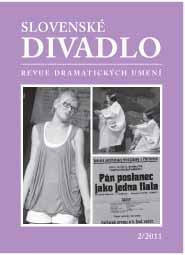Dva svety dokumentárneho divadla
Two Worlds of Documentary Theatre
Author(s): Dagmar PodmakováSubject(s): Theatre, Dance, Performing Arts
Published by: Ústav divadelnej a filmovej vedy SAV
Summary/Abstract: Based on the examples of contemporary Slovak documentary theatre, the author characterizes three main groups of this type of theatre. The firs group is characterized by creating a dramatic Picture using the most authentic material, that might overlap with non-fiction literature (e.g. Tiso, written and directed by Rastislav Ballek, Arena Theatre, Bratislava, 2005, M.H.L. by Sláva Daubnerová, 2010, Theatre P.A.T. Prievidza and Studio 12 Bratislava). The second group is characterized by creating a play/ drama with the text based on the collected materials of documentary and historical nature, such as newspaper articles and interviews with living witnesses that support the storyline. (e.g. Dr. Gustáv Husák by Viliam Klimáček, Arena Theatre). The third group consists of texts that through the prism of individual and collective memory recall the past, with the accent on one’s own view, or memories (e.g. The Velvet by Michal Ditte, Slovak Chamber Theatre, Martin, 2009). A special chapter is Russian documentary theatre. The most famous projects combine specific event captured through interviews and documentary materials (e.g. interactive production One Hour and Eighteen (Minutes) by Elena Gremina, Teatr.doc. Moscow). Another group consists of productions, that “revise” history through the prism of present-day reality, using documentary materials (contemporary film footage, speeches, songs) in confrontation with the present-day reality (e.g, Pavlik is my God by Nina Belenitskaya, Joseph Beuys Theatre and Dokumentalny Dom „The First Cinema“ Moscow on Pavlik Morozovov).
Journal: Slovenské divadlo
- Issue Year: 59/2011
- Issue No: 02
- Page Range: 130-144
- Page Count: 15
- Language: Slovak

